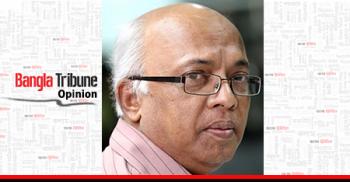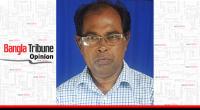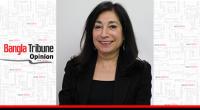 There are good people, individuals we respect for their wisdom, who sometimes disappoint us through committing blunders we do not expect them to commit. A few days ago, at a rally organised to protest the recent assaults on students and teachers asking for a reform of the quota system in recruitment to government services, a senior teacher of Dhaka University raised a couple of questions he should not have. The melodramatic manner in which he put those questions before his audience, we have been duly informed, resulted in what was clearly misplaced applause for him. He must have felt happy.
There are good people, individuals we respect for their wisdom, who sometimes disappoint us through committing blunders we do not expect them to commit. A few days ago, at a rally organised to protest the recent assaults on students and teachers asking for a reform of the quota system in recruitment to government services, a senior teacher of Dhaka University raised a couple of questions he should not have. The melodramatic manner in which he put those questions before his audience, we have been duly informed, resulted in what was clearly misplaced applause for him. He must have felt happy.
Academics are not expected to play to the gallery, but they are surely entitled to protest manifest wrong whenever and wherever it is committed. In this particular instance, these academics were perfectly within their rights to demand that those elements who have in recent weeks committed outrage on the Dhaka University campus by subjecting quota reformists to unspeakable violence be brought to justice. These assaults were a scar on our self-esteem as a people. The rule of law demands that those guilty of such criminality be put on the leash and penalised for their arrogance and audacity.
But nothing of what has been stated above is any reason to take lightly the senior academic who raised those questions before his approving audience. His first question related to whether Sheikh Hasina had taken part in the War of Liberation. His second question, somewhat more disturbing, was directed at Bangabandhu Sheikh Mujibur Rahman’s absence in the War of Liberation. There was not merely naivete at work here. At the risk of sounding rude, one might suggest that these questions were a patent attempt to undermine the place of the Father of the Nation and his family in the history of this country. Lest the academic forget, lest anyone else forget, Sheikh Mujibur Rahman and his family have consistently paid a heavy price for their politics both before and following the liberation of Bangladesh.
No, Sheikh Hasina did not don guerrilla fatigues in the war for national freedom. But she and her family were a focal point of the Pakistan occupation army’s preoccupation in the nine months of the war. Begum Fazilatunnessa Mujib and her children — and Sheikh Hasina was pregnant with her first child at the time — were compelled to move from one place to another because the soldiers were on the lookout for them. It was a time when no one, not even people close to them, was willing to give them shelter. And then the army eventually found them and had them confined at a residence on Dhanmondi Road 18. It was in that home that Bangabandhu’s family spent the rest of the war and was only freed on 16 December 1971.
If that was not participation by Sheikh Hasina and her family in the war, what was? And perhaps the learned academic did not remember that it was from that home in Dhanmondi Road 18 that Bangabandhu’s son Sheikh Jamal made his escape and linked up with the War of Liberation. And, of course, Sheikh Kamal was already in the war and serving as aide de camp to Colonel MAG Osmany. The answer to the academic’s question is simple: Sheikh Hasina and her family were prisoners during the war; Sheikh Hasina’s brothers were waging war on the battlefield. What else does one need to prove before the academic and his friends that the family of Sheikh Mujibur Rahman was fully involved in the war?
The academic would rhetorically like to know if Bangabandhu took part in the war. He does not know? The answer is — yes, Bangabandhu did. His entire adult political life was spent waging war for Bengali freedom. He was the one man whose sights from the early 1960s were fixed on ultimate national liberty. He it was who had the Six Points formulated. In December 1969, he it was who decreed that East Pakistan would thenceforth be known as Bangladesh. It was he who told us, in clear and unequivocal terms on 7 March 1971, that the struggle had turned into one for independence. His message of independence was heard on the ether in the early minutes of the War of Liberation.
And, yes, there is this reminder we need to place before the academic and before all of Bangabandhu’s detractors: in August 1971, the Pakistani military junta placed Bangabandhu on trial before a secret military tribunal on charges of waging war against Pakistan. In that dank, dark room before the soldiers, the Father of the Nation was busy waging war for Bangladesh’s freedom.
Let the facts be clear. Bangabandhu and his family have paid a price beyond measure for the liberation of this country. To now question their role in the war is to deliberately attempt to undermine the profound respect this nation holds them in. The sufferings of Bangabandhu’s family did not end with the war. Almost all of them were mown down by conspirators in August 1975. Sheikh Hasina and Sheikh Rehana were forced to live in exile till 1981; and Sheikh Hasina was not permitted to enter her devastated family home when she returned to the country in May 1981.
To argue in defence of the quota reformists is fine. To ask that action be taken against the villainous men who saw nothing wrong in assaulting students and teachers is perfectly legitimate. But to question the place of Bangabandhu Sheikh Mujibur Rahman and his family in Bangladesh’s history is insinuation at best and provocation at worst.
Syed Badrul Ahsan is the Editor-in-Charge at The Asian Age


